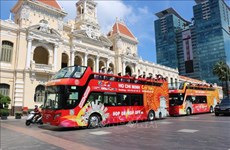Ha Long Bay puts safety first
Many tourists were disappointed when they arrived at Bai Chay Port
in Ha Long Bay ready for a boating adventure through the World
Heritage site on June 10 to find that hundreds of tour boat owners had
ceased operations.
Many tourists were disappointed when they arrived at Bai Chay Port
in Ha Long Bay ready for a boating adventure through the World
Heritage site on June 10 to find that hundreds of tour boat owners had
ceased operations.
Boat owners were staging a strike against a new decision passed by the Quang Ninh People's Committee on boat operations. The decision, released in March, was a move by local authorities to improve boat safety after the vessel Truong Hai Boat sunk in February and left 12 people dead. All commercial boats were required to meet the new safety regulations by June 10 in order to receive permission to resume operations.
Owners said the regulations were impossible to meet in such a short period of time. New requirements called for all staff on board to have high school diplomas, at least two were required to have first aid training and boats had to be equipped with standard fire suppression systems.
Speaking to media at the strike, Nguyen Anh Duc, vice president of Bai Tho Tourism Company, which owns several commercial boats in Ha Long Bay, said that setting up standard fire extinguishing equipment would cost as much as 100 million VND (4,700 USD) and would also take up a lot of space on the boat.
Quang Ninh provincial People's Committee held official meetings with the boat owners and vowed to consider their concerns.
Some boats resumed operations two days after the strike although no decisions had been made on revisions to the new regulations or how much time owners had to upgrade their boats.
Nguyen Van Toan, head of the legislation office under the Ministry of Transport's Vietnam Inland Waterways Administration, said that his office was collaborating with local authorities to examine the situation but had yet to reach a conclusion.
When considering boat safety in Ha Long Bay, it's easy to see that the regulations imposed by the Quang Ninh People's Committee are in fact crucial and necessary. It is not reasonable to refuse to follow the regulations just because the fire suppression equipment is too expensive or that the staff on boats is not well educated. Graduation from high school probably does not guarantee that the staff will follow all the necessary safety regulations but earning a boat operation safety certificate could help improve safety.
The problems however lie in the management process and regulation enforcement methods. "Policy makers should have foreseen all the necessary requirements for a boat to operate safely but we usually only recognise them after there has already been an accident," said Pham Trung Luong, deputy head of the Institute of Tourism Development Research , under the Ministry of Culture, Sports, and Tourism. "Now it's time for researchers and policy makers to sit down and look back at existing policies to avoid further accidents in other areas too," he said.
Luong has a point. "We should not forget that two people were killed last March in an apartment fire in Hanoi because of the building's poor fire safety." After the accidents, fire safety policies for apartment buildings were immediately generated and inspections were carried out in apartments all over the city.
Nguyen Van Son, deputy director of the city's fire department said the regulations helped but were very costly for many buildings and sometimes they found it impossible to comply. He blamed financial reasons for the problem because many state-owned buildings had a very limited budget making it impossible to keep up with regular fire equipment maintenance.
In conclusion, I think it's important for policy makers to establish safety regulations before it gets to a point where it's ‘better late than never.' But it is also crucial for the regulations to be paired with detailed instructions to help people follow them in a timely-manner. Lastly, the regulations should be enforced properly even in the face of strikes because in the end, safety should always be prioritised./.
Boat owners were staging a strike against a new decision passed by the Quang Ninh People's Committee on boat operations. The decision, released in March, was a move by local authorities to improve boat safety after the vessel Truong Hai Boat sunk in February and left 12 people dead. All commercial boats were required to meet the new safety regulations by June 10 in order to receive permission to resume operations.
Owners said the regulations were impossible to meet in such a short period of time. New requirements called for all staff on board to have high school diplomas, at least two were required to have first aid training and boats had to be equipped with standard fire suppression systems.
Speaking to media at the strike, Nguyen Anh Duc, vice president of Bai Tho Tourism Company, which owns several commercial boats in Ha Long Bay, said that setting up standard fire extinguishing equipment would cost as much as 100 million VND (4,700 USD) and would also take up a lot of space on the boat.
Quang Ninh provincial People's Committee held official meetings with the boat owners and vowed to consider their concerns.
Some boats resumed operations two days after the strike although no decisions had been made on revisions to the new regulations or how much time owners had to upgrade their boats.
Nguyen Van Toan, head of the legislation office under the Ministry of Transport's Vietnam Inland Waterways Administration, said that his office was collaborating with local authorities to examine the situation but had yet to reach a conclusion.
When considering boat safety in Ha Long Bay, it's easy to see that the regulations imposed by the Quang Ninh People's Committee are in fact crucial and necessary. It is not reasonable to refuse to follow the regulations just because the fire suppression equipment is too expensive or that the staff on boats is not well educated. Graduation from high school probably does not guarantee that the staff will follow all the necessary safety regulations but earning a boat operation safety certificate could help improve safety.
The problems however lie in the management process and regulation enforcement methods. "Policy makers should have foreseen all the necessary requirements for a boat to operate safely but we usually only recognise them after there has already been an accident," said Pham Trung Luong, deputy head of the Institute of Tourism Development Research , under the Ministry of Culture, Sports, and Tourism. "Now it's time for researchers and policy makers to sit down and look back at existing policies to avoid further accidents in other areas too," he said.
Luong has a point. "We should not forget that two people were killed last March in an apartment fire in Hanoi because of the building's poor fire safety." After the accidents, fire safety policies for apartment buildings were immediately generated and inspections were carried out in apartments all over the city.
Nguyen Van Son, deputy director of the city's fire department said the regulations helped but were very costly for many buildings and sometimes they found it impossible to comply. He blamed financial reasons for the problem because many state-owned buildings had a very limited budget making it impossible to keep up with regular fire equipment maintenance.
In conclusion, I think it's important for policy makers to establish safety regulations before it gets to a point where it's ‘better late than never.' But it is also crucial for the regulations to be paired with detailed instructions to help people follow them in a timely-manner. Lastly, the regulations should be enforced properly even in the face of strikes because in the end, safety should always be prioritised./.












